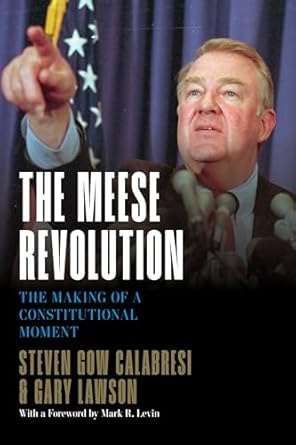
Gary Lawson and I have just published an intellectual biography of former Attorney General Ed Meese, which argues that Ed Meese is the most influential person ever to hold the office of U.S. attorney general—but almost no one knows it. (The runners-up are: Homer S. Cummings (1933-1939) and Robert F. Kennedy (1961 to 1964), neither of whom helped to win the Cold War or to shape judicial selection for nearly forty years.) We explain why Ed Meese beats out Cummings and RFK in 401 pages of text. We think our book would be of great interest to many of the readers of this blog.
Ed Meese was at the center of virtually every major accomplishment of Ronald Reagan's transformational presidency, from winning the Cold War without firing a shot to the economic boom that by the end of the 1980s was the envy of the world. Meese served for nearly eight years on President Ronald Reagan's National Security Counsel, and when Meese and Secretary of State George P. Schulz disagreed, President Reagan always sided with Ed Meese. Meese also served as the Chairman of President Reagan's Domestic Policy Counsel. Ed Meese was in all matters of policy President Ronald Reagan's right hand man in waging the Reagan Revolution.
Our book reveals that Ed Meese: (1) urged Ronald Reagan to make Bill Casey his campaign manager in 1980 after Reagan won the New Hampshire Republican primary that year and later to name him as head of the CIA; (2) urged Ronald Reagan to make George H.W. Bush his running mate in 1980; (3) managed Ronald Reagan's presidential transition in 1980, baking in the submission of Reagan's revolutionary slashing of marginal tax rates in legislation submitted to Congress as soon as Reagan took office; (4) advised President Reagan on the firing of air traffic controller union members who went out on strike in 1981; (5) convened the first meeting with President Reagan in the White House on developing the strategic missile defense systems from which the Patriot missile systems now defending Kiev and Tel Aviv are descended; (6) urged President Ronald Reagan's first term judicial appointments of Judges Robert H. Bork, Antonin Scalia, and Ralph K. Winter, among many others; (7) helped President Reagan confidentially hire his third White House Chief of Staff, Howard Baker, when Donald Regan resigned because of the Iran-Contra scandal; and (8) with the help of Leonard Leo, successfully lobbied President George W. Bush to appoint Justices Samuel Alito and John Roberts to the U.S. Supreme Court in 2005.
More to the point for our book, Ed Meese is the person most responsible for the rise of constitutional originalism, a style of legal interpretation that treats the text and original meaning of the Constitution rather than the policy fads of the moment as authoritative law. Ed Meese gave more than thirty speeches on constitutional law and originalism during his tenure as Attorney General debating liberal Justices William J. Brennan, Jr. and John Paul Stevens. Meese gave speeches on originalism, constitutional criminal procedure, religious liberty, economic liberties, the separation of powers, and federalism, as well as on many other legal subjects.
Our book tells the inside story of the nominations during Ronald Reagan's presidency of Chief Justice William H. Rehnquist and of Justices Antonin Scalia and Anthony M. Kennedy, as well as the unsuccessful Supreme Court nomination of Judge Robert H. Bork. We explain that former Chief Justice Warren Burger gave Meese more than eight months notice of his resignation in June 1986, but that this news never leaked because only Reagan, Meese, and two top Meese aides knew about it. We describe Meese's success when he was Attorney General in urging President Reagan to appoint such stellar federal court of appeals judges as Judges Laurence J. Silberman, James L. Buckley, Stephen F. Williams, Douglas H. Ginsburg, David B. Sentelle, J. Daniel Mahoney, J. Harvie Wilkinson, Edith Jones, Jerry Smith, Danny Boggs, Frank Easterbrook, Pasco Bowman, Diarmuid O'Scannlain, and many, many others.
We discuss how Ed Meese's legacy of superb judicial appointments was, through Meese's shrewdness, carried on by President George H.W. Bush, and by his White House Counsel C. Boyden Gray—with the aide of Meese DOJ alumna Lee Liberman Otis—who secured Justice Clarence Thomas's appointment to the Supreme Court and the appointments to the federal courts of appeals of Judges Ray Randolph, Michael Boudin, John Walker, Dennis Jacobs, Samuel Alito, Paul Niemeyer, Morris Arnold, and many others.
Finally, we explain how Ed Meese helped bring Don McGahn, President Donald Trump's first White House Counsel and judicial appointments advisor into the Federalist Society by befriending him when he was a law student attending a Federalist Society National Lawyers' Convention in the mid-1990's. Don McGahn, and President Trump, brought to fruition the Meese Revolution on the Supreme Court between 2017 and 2021 with the splendid appointments of Justices Neil Gorsuch, Brett Kavanaugh, and Amy Coney Barrett—aided again by Leonard Leo.
Today, in 2024, originalism is a major force in the courts, with a majority of Supreme Court justices and a raft of lower-court and state-court judges at least taking it seriously as a major contributor to decision-making. That would have been unthinkable in 1985 when Meese took office. At that time, originalism was essentially unknown to the legal academy and almost wholly absent from the judicial process. Ed Meese turned the U.S. Department of Justice into "the academy in exile," where originalism was developed, refined, theorized, and put into practice.
Our book describes Ed Meese's central role in the rise of originalism. Meese's story threads through virtually all important legal and policy events of the 1980's, many of which continue to shape the world of the 21st Century. We are still living through the Meese Revolution.
The post <i>The Meese Revolution: The Making of a Constitutional Moment</i> (2024) appeared first on Reason.com.







